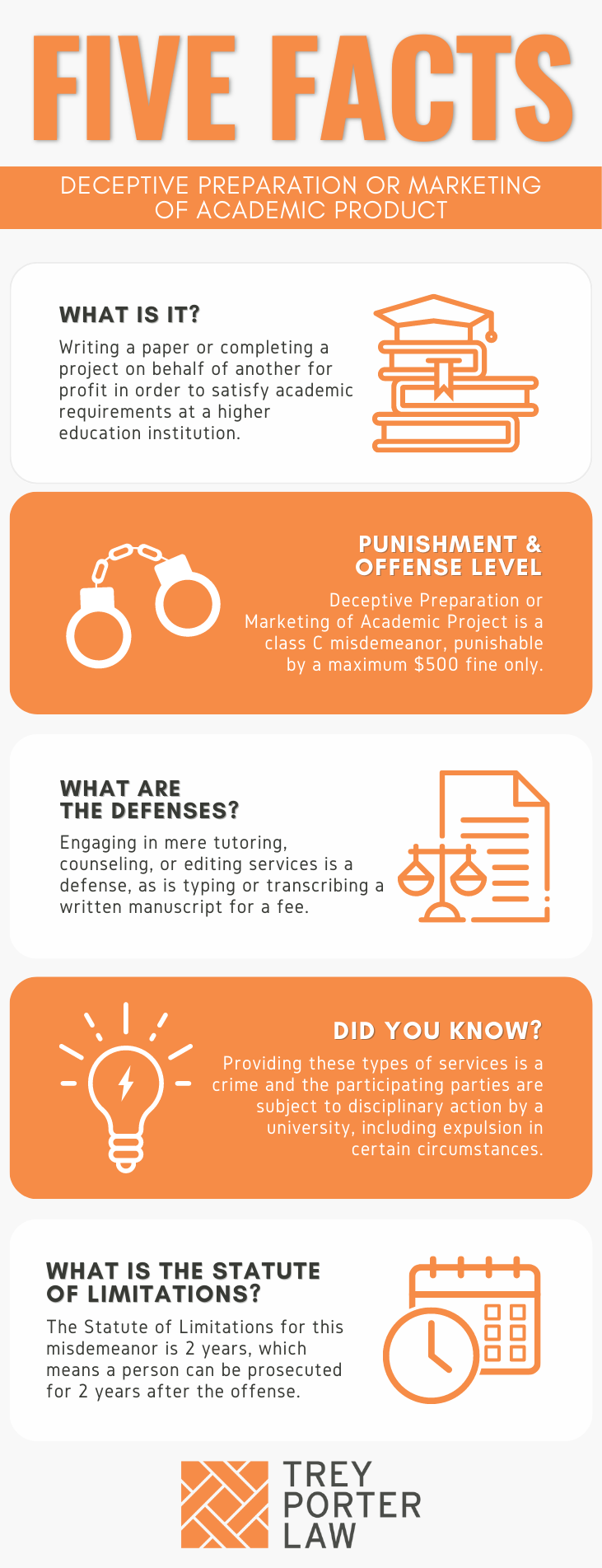WHAT IS DECEPTIVE PREPARATION AND MARKETING OF ACADEMIC PRODUCT IN TEXAS?
The Texas law against deceptive preparation and marketing of academic products prohibits plagiarism and ghostwriting a thesis, dissertation, term paper, or other artistic product or material for a profit to satisfy another person’s academic requirement at an institution of higher education.

WHAT IS THE DECEPTIVE PREPARATION AND MARKETING OF ACADEMIC PRODUCT LAW IN TEXAS?
Tex. Penal Code § 32.50. DECEPTIVE PREPARATION AND MARKETING OF ACADEMIC PRODUCT.
(b) A person commits an offense if, with intent to make a profit, the person prepares, sells, offers or advertises for sale, or delivers to another person an academic product when the person knows, or should reasonably have known, that a person intends to submit or use the academic product to satisfy an academic requirement of a person other than the person who prepared the product.
(c) A person commits an offense if, with intent to induce another person to enter into an agreement or obligation to obtain or have prepared an academic product, the person knowingly makes or disseminates a written or oral statement that the person will prepare or cause to be prepared an academic product to be sold for use in satisfying an academic requirement of a person other than the person who prepared the product.
(d) It is a defense to prosecution under this section that the actor’s conduct consisted solely of action taken as an employee of an institution of higher education in providing instruction, counseling, or tutoring in research or writing to students of the institution.
(e) It is a defense to prosecution under this section that the actor’s conduct consisted solely of offering or providing tutorial or editing assistance to another person in connection with the other person’s preparation of an academic product to satisfy the other person’s academic requirement, and the actor does not offer or provide substantial preparation, writing, or research in the production of the academic product.
(f) It is a defense to prosecution under this section that the actor’s conduct consisted solely of typing, transcribing, or reproducing a manuscript for a fee, or of offering to do so.
(g) An offense under this section is a Class C misdemeanor.
WHAT IS THE PENALTY CLASS FOR DECEPTIVE PREPARATION AND MARKETING OF ACADEMIC PRODUCT IN TEXAS?
The penalty classification for deceptive preparation and marketing is a Class C misdemeanor, punishable by a maximum $500 fine.
WHAT IS THE PUNISHMENT RANGE FOR DECEPTIVE PREPARATION AND MARKETING OF ACADEMIC PRODUCT IN TEXAS?
The punishment range for deceptive preparation and marketing of academic products, a Class C misdemeanor, is a maximum $500 fine and no jail time.
WHAT ARE THE PENALTIES FOR DECEPTIVE PREPARATION AND MARKETING OF ACADEMIC PRODUCT IN TEXAS?
A person charged with deceptive preparation and marketing of academic products, a Class C misdemeanor, may be placed on deferred adjudication as an alternative to a conviction for a period not to exceed 180 days.
WHAT ARE THE DEFENSES TO DECEPTIVE PREPARATION AND MARKETING OF ACADEMIC PRODUCT IN TEXAS?
The statute explains it is a defense to deceptive preparation and marketing of academic products if the accused:
- was an employee of an institution of higher education providing instruction, counseling, or tutoring to students of the institution;
- was offering or providing tutorial or editing assistance to another in connection with the other person’s preparation of an academic product to satisfy the person’s academic requirement, and the accused does not offer or provide substantial preparation, writing, or research in the production of the academic product; or
- merely typed, transcribed, or reproduced a manuscript for a fee, or offered to do so.
WHAT IS THE STATUTE OF LIMITATIONS FOR DECEPTIVE PREPARATION AND MARKETING OF ACADEMIC PRODUCT IN TEXAS?
The limitation period for deceptive preparation and marketing of an academic product, a Class C misdemeanor, is two years.
DECEPTIVE PREPARATION AND MARKETING OF ACADEMIC PRODUCT IN TEXAS
Selling academic products intended to satisfy another’s course credit, requirements for a degree, diploma, or certificate program is punishable as a Class C misdemeanor in Texas. In practice, proving ghostwriting for a profit is difficult, and rarely prosecuted.
















